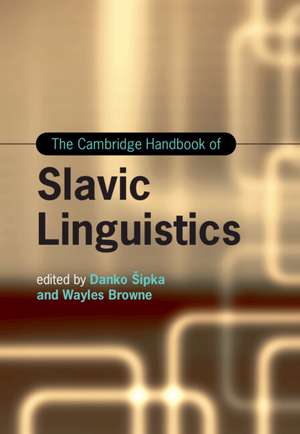The Cambridge Handbook of Slavic Linguistics: Cambridge Handbooks in Language and Linguistics
Editat de Danko Šipka, Wayles Browneen Limba Engleză Hardback – 30 mai 2024
Din seria Cambridge Handbooks in Language and Linguistics
-
 Preț: 257.36 lei
Preț: 257.36 lei -
 Preț: 419.59 lei
Preț: 419.59 lei -
 Preț: 282.02 lei
Preț: 282.02 lei - 14%
 Preț: 989.27 lei
Preț: 989.27 lei - 23%
 Preț: 982.81 lei
Preț: 982.81 lei -
 Preț: 421.83 lei
Preț: 421.83 lei -
 Preț: 284.81 lei
Preț: 284.81 lei -
 Preț: 338.63 lei
Preț: 338.63 lei -
 Preț: 297.50 lei
Preț: 297.50 lei -
 Preț: 280.50 lei
Preț: 280.50 lei -
 Preț: 285.18 lei
Preț: 285.18 lei -
 Preț: 284.94 lei
Preț: 284.94 lei -
 Preț: 281.54 lei
Preț: 281.54 lei -
 Preț: 280.68 lei
Preț: 280.68 lei - 19%
 Preț: 495.90 lei
Preț: 495.90 lei -
 Preț: 417.90 lei
Preț: 417.90 lei - 14%
 Preț: 880.33 lei
Preț: 880.33 lei -
 Preț: 419.23 lei
Preț: 419.23 lei -
 Preț: 315.15 lei
Preț: 315.15 lei - 23%
 Preț: 977.84 lei
Preț: 977.84 lei - 23%
 Preț: 1493.38 lei
Preț: 1493.38 lei -
 Preț: 419.93 lei
Preț: 419.93 lei - 19%
 Preț: 451.06 lei
Preț: 451.06 lei - 23%
 Preț: 949.77 lei
Preț: 949.77 lei - 23%
 Preț: 1066.00 lei
Preț: 1066.00 lei - 14%
 Preț: 989.06 lei
Preț: 989.06 lei -
 Preț: 347.32 lei
Preț: 347.32 lei -
 Preț: 370.92 lei
Preț: 370.92 lei - 23%
 Preț: 1075.01 lei
Preț: 1075.01 lei - 23%
 Preț: 1023.97 lei
Preț: 1023.97 lei - 11%
 Preț: 507.18 lei
Preț: 507.18 lei - 23%
 Preț: 753.13 lei
Preț: 753.13 lei -
 Preț: 473.75 lei
Preț: 473.75 lei -
 Preț: 468.73 lei
Preț: 468.73 lei - 23%
 Preț: 1027.19 lei
Preț: 1027.19 lei -
 Preț: 398.99 lei
Preț: 398.99 lei -
 Preț: 398.39 lei
Preț: 398.39 lei
Preț: 969.37 lei
Preț vechi: 1258.92 lei
-23% Nou
Puncte Express: 1454
Preț estimativ în valută:
185.51€ • 192.96$ • 153.15£
185.51€ • 192.96$ • 153.15£
Carte tipărită la comandă
Livrare economică 15-29 aprilie
Preluare comenzi: 021 569.72.76
Specificații
ISBN-13: 9781108832670
ISBN-10: 1108832679
Pagini: 840
Greutate: 1.46 kg
Editura: Cambridge University Press
Colecția Cambridge University Press
Seria Cambridge Handbooks in Language and Linguistics
Locul publicării:Cambridge, United Kingdom
ISBN-10: 1108832679
Pagini: 840
Greutate: 1.46 kg
Editura: Cambridge University Press
Colecția Cambridge University Press
Seria Cambridge Handbooks in Language and Linguistics
Locul publicării:Cambridge, United Kingdom
Cuprins
Slavic linguistics introduction Wayles Browne; 1. Word stress Draga Zec; 2. Vocalism: the vowels Irena Sawicka; 3. Consonantism: the consonants Peter Jurgec; 4. Syllable structure Alexei Kochetov; 5. Phonologically conditioned alternations Darya Kavitskaya; 6. Prosodic reflexes of information structure Radek Simík; 7. Inflectional endings: declensions Marek Majer; 8. Inflectional endings: conjugation Ian Press; 9. Tense and mood forms Hagen Pitsch; 10. Aspect in verbs Stephen M. Dickey; 11. Lexical derivation Frank Y. Gladney; 12. Lexical composition Mate Kapović; 13. Agreement Jana Willer gold; 14. Wh-constructions and wh-dependencies Barbara Citko; 15. Coordination and subordination in slavic languages Milan Mihaljević; 16. Numerals and quantity expressions Steven Franks; 17. Placement and ordering of the (en)clitics Lanko Marušič, Petra Mišmaš and Rok Zaucer; 18. Secondary predication Nerea Madariaga; 19. Negation and polarity Luka Szucsich; 20. Null subjects Alina Lsraeli; 21. Voice Jasmina Milićević; 22. Morphosyntactic reflexes of information structure Elena Titov; 23. The structure of the lexicon Valentina Apresjan and Alexei Shmelev; 24. Lexical semantics (insights from lexicology) Rajna Dragićević; 25. Lexical borrowing Rajna Dragićević; 26. Sociolinguistic variation in slavic languages Serge Sharoff; 27. False cognates Danko Šipka and Mladen Uhlik; 28. Dialectal fragmentation Joseph Schallert; 29. Language contacts Dieter Stern; 30. The slavic literary micro-languages Motoki Nomachi; 31. Heritage language forms Oksana Laleko; 32. Scripts Daniel Bunčić; 33. Orthographies Daniel Bunčić; 34. Psycholinguistics and language acquisition Tanya Ivanova-Sullivan and Irina A. Sekerina; 35. Natural language processing Tomaž Erjavec.
Descriere
With contributions from a global team of authors, this Handbook provides a systematic review of cutting-edge research in Slavic linguistics.
